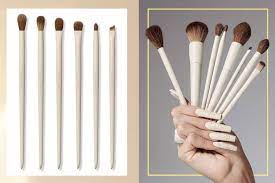The Importance of Cleaning Your Makeup Brushes: Unveiling the Hidden Dangers

Introduction:
Makeup brushes are essential tools for achieving flawless beauty looks. From foundation application to eyeshadow blending, they play a crucial role in our daily routines. However, one aspect that often goes overlooked is the significance of regular cleaning. Neglecting to clean your makeup brushes can lead to a buildup of bacteria, dirt, and other potential risks to your skin. In this blog post, we will shed light on the importance of cleaning your makeup brushes, explore the potential dangers that can arise from neglecting this routine, and provide you with the right way to keep your brushes fresh and clean.
1. Bacterial Buildup and Skin Health:
Makeup brushes come into contact with your skin, makeup products, and the environment, making them a breeding ground for bacteria. As you use these brushes repeatedly, oils, dead skin cells, and leftover product accumulate, providing an ideal environment for harmful bacteria to thrive. This bacterial buildup can lead to breakouts, skin irritations, and even infections. Regularly cleaning your brushes helps eliminate these microorganisms, promoting healthier skin and preventing potential skin issues.
2. Maintaining Makeup Performance:
Dirty brushes can negatively impact the performance and appearance of your makeup. When makeup residue and oils accumulate on the bristles, they can alter the color, texture, and finish of the products you apply. This can result in uneven application, patchiness, and a less-than-desirable makeup look. By keeping your brushes clean, you ensure that your makeup applies smoothly and accurately, allowing you to achieve the desired results with ease.
3. Extending Brush Lifespan:
Investing in high-quality makeup brushes can be a significant financial commitment. Proper cleaning and maintenance are crucial for extending the lifespan of your brushes. The accumulation of makeup residue, oils, and bacteria can deteriorate the bristles over time, leading to shedding, fraying, and reduced performance. By regularly cleaning your brushes, you protect their integrity and longevity, ensuring that they remain effective and durable for years to come.
Cleaning your makeup brushes properly is essential for maintaining their performance and preventing the buildup of bacteria. Here's a step-by-step guide on the right way to clean your makeup brushes:
1. Gather Your Supplies:
Collect mild soap or brush cleanser, lukewarm water, a clean towel, and a brush cleaning mat or a textured surface.
2. Wetting the Bristles:
Thoroughly wet the bristles of the brush with lukewarm water. Be cautious to avoid wetting the ferrule (the metal part) of the brush, as it can loosen the glue that holds the bristles together.
3. Cleansing:
Add a small amount of mild soap or brush cleanser onto your brush cleaning mat or textured surface. Gently swirl the brush bristles in the soap, working the product through the bristles to remove makeup residue, oils, and bacteria. Alternatively, you can lather the soap in your hands and swirl the brush between your fingers. Pay attention to each brush individually, ensuring all the bristles are thoroughly cleaned.
4. Rinsing:
Rinse the bristles under lukewarm water, holding the brush with the bristles pointing downwards. Continue rinsing until the water runs clear. Make sure to rinse off all the soap or cleanser residue.
5. Drying:
Gently squeeze out any excess water from the bristles. Reshape the brush head if necessary and lay the brushes flat on a clean towel to air dry. Avoid drying them upright, as this can cause water to seep into the ferrule and loosen the bristles. Allow the brushes to dry completely before using them again.
6. Frequency:
Ideally, clean your makeup brushes at least once a week, especially for brushes used with liquid or cream products like foundation or concealer. Brushes used for powder-based products can be cleaned every two weeks. However, if you have sensitive or acne-prone skin, it's recommended to clean your brushes more frequently to minimize the risk of bacterial buildup.
Additional Tips:
- Avoid soaking the entire brush in water, as it can damage the bristles and affect the glue that holds them together.
- Use gentle motions while cleaning to prevent excessive rubbing or pulling on the bristles.
- If you're short on time or need to clean your brushes between uses, you can use a brush cleanser spray or wipes to quickly disinfect them.
- Never dry your brushes using a hairdryer or any other heating tool, as it can damage the bristles.
By following these steps and incorporating regular brush cleaning into your beauty routine, you'll ensure that your makeup brushes remain hygienic, perform optimally, and help you achieve flawless makeup application.

